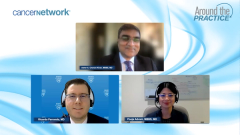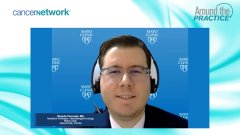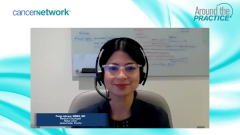
Treatment Approaches in CLL After Disease Progression Following Combination Therapy With Venetoclax and BTKi
Key opinion leaders detail strategies for patients with chronic lymphocytic leukemia relapsing after fixed-duration BTK and BCL2 inhibitor treatment, emphasizing the importance of genetic testing for mutations that could render them resistant to a re-challenge and considering third-generation BTK inhibitors if mutations are found.
Episodes in this series

Asher A. Chanan-Khan, MD, MBBS: One thing we didn’t mention is [that] when you’re going to be using a BCL2 combination by itself, tumor lysis syndrome [TLS], at least with venetoclax, is it a concern. If you have concerns, I think there are guidelines that you should look at in terms of who is at high risk or low risk for TLS and what appropriate measures should be taken. I agree with Dr Parrondo that the SEQUOIA trial [NCT03336333] arm D will be very interesting. Initial results are showing very high efficacy, but the number of patients reported so far is limited, but [it’s] definitely very encouraging. So the question is, Dr Parrondo, would you consider, when we start thinking about limited-duration or fixed-duration combination therapies—which are very attractive to patients, because who wants to take treatment forever—but if we can safely design a treatment with the same outcomes, a fixed duration, whether it be a combination of venetoclax plus BTKi [inhibitor]? The question would be, OK, you stopped the treatment after a limited duration, [so] what do you do when you consider retreatment, and should the treatment be a BTKi in this setting or not? I’d love to hear your thoughts. This is an…area that is evolving, but we’d love to hear your thoughts. Then I can chime in with what I do in my practice.
Ricardo Parrondo, MD:: When patients progress after a fixed-duration BTKi plus BCL2 inhibitor, I definitely think you can use either/or at the time of relapse. At least with venetoclax, we have data that you can reuse it after patients progress with a venetoclax-based regimen, and they respond with quite high response rates. There was a retrospective study from a group at [Memorial] Sloan Kettering. They found that the PFS [progression-free survival] with a re-challenge of venetoclax was about 25 months and [had] an overall response rate of 80%. So you can definitely re-challenge and the same with BTKi. But it’s not a bad idea to get NGS [next-generation sequencing] for mutation testing. It’s possible that when patients were exposed for that time-limited duration, they may have developed mutations in BTK or BCL2 that may render them resistant to a re-challenge. So I think that’s an important aspect to consider when re-challenging.
Asher A. Chanan-Khan, MD, MBBS: Yes, I think I agree with you. For practical purposes for our audience, I think the 2 things that I heard from you were…before starting, if somebody is on a time-limited therapy and they relapse or they start to progress, the question would be, have they mutated and is reinstating a BTKi a reasonable choice? I don’t think it should be a reflex. I think you nicely pointed out that access to sequencing is very convenient nowadays. If you are able to do that and look for BTK mutations, then the BTKi becomes a contraindication if you’re relying on [a] second generation. But if you’re going on a third generation, if you have access to clinical trials or LOXO-305 routinely, then that may just be a choice to do that. Although there is data to suggest that’s an area of very high response rates; in the ballpark of [approximately] 70% response, as you could see. So if there is a mutation, perhaps going to the third-generation BTKi is much more important than just continuing the same BTK. And if there is no mutation, then I agree with you that either reinstituting a doublet or, if the patients are on a first generation to begin [with], going to a combination and a second-generation BTKi because that would still show some response.
Newsletter
Stay up to date on recent advances in the multidisciplinary approach to cancer.








































